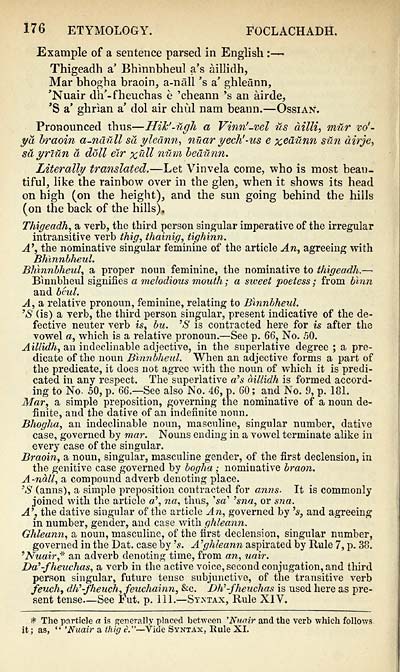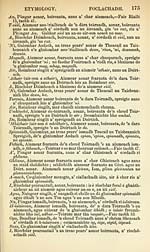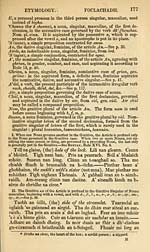Books and other items printed in Gaelic from 1841 to 1870 > Stéidhean a' Ghràmair Ghaëlig
(204) Page 176
Download files
Complete book:
Individual page:
Thumbnail gallery: Grid view | List view

176 ETYMOLOGY.
FOCLACHADH.
Example of a sentence parsed in English : — -
Thigeadh a' Bhìnnhheul a's àillidh,
Mar bhogha braoin, a-nàll 's a' ghleànn,
'Nuair dh'-fheuchas è 'cheann 's an àirde,
'S a' ghrìan a' dol air chùl nam beann. — Ossian.
Pronounced thus — Hih'-ùgh a Vinn'-vel ùs àilli, mùr vo'-
yà braoin a-ndùll sà yleànn, nùar yech'-us e %edùnn sùn àirje,
sàyrlùn à dòll eìr %ùll nùm hedùnn.
Literally translated. — Let Vinvela come, who is most beau-
tiful, like the rainbow over in the glen, when it shows its head
on high (on the height), and the sun going behind the hills
(on the back of the hills),
Thigeadh, a verb, the third person singular imperative of the irregular
intransitive verb thig, thainig, tighinn.
A\ the nominative singular feminine of the article An, agreeing with
Bhìnnbheul.
Bhìnnbheul, a proper noun feminine, the nominative to thigeadh. —
Bìnnbheul signifies a melodious mouth; a sweet poetess ; from bìnn
and beul.
A, a relative pronoun, feminine, relating to Bìnnbheul.
'S (is) a verb, the third person singular, present indicative of the de-
fective neuter verb is, bu. 'S is contracted here for is after the
vowel a, which is a relative pronoun. — See p. 66, No. 50.
Aillidh, an indeclinable adjective, in the superlative degree ; a pre-
dicate of the noun Binnbheul. When an adjective forms a part of
the predicate, it does not agree with the noun of which it is predi-
cated in any respect. The superlative a's àillidh is formed accord-
ing to No. 50, p. 66— See also No. 46, p. 60 ; and No. 9, p. 181.
Mar, a simple preposition, governing the nominative of a noun de-
finite, and the dative of an indennite noun.
Bhogha, an indeclinable noun, masculine, singular number, dative
case, governed by mar. Nouns ending in a vowel terminate alike in
every case of the singular.
Braoin, a noun, singular, masculine gender, of the first declension, in
the genitive case governed by bogha ; nominative braon.
A-nàll, a compound adverb denoting place.
P S (anns), a simple preposition contracted for anns- It is commonly
joined with the article a', na, thus, 'sa' 'sna, or sna.
A\ the dative singular of the article An, governed by '5, and agreeing
in number, gender, and case with ghleann.
Ghleann, a noun, masculine, of the first declension, singular number,
governed in the Dat. case by 's. A'ghleann aspirated by Rule 7, p. 38.
'Nuair* an adverb denoting time, from an, uair.
Da'-fheuchas, a verb in the active voice, second conjugation, and third
person singular, future tense subjunctive, of the transitive verb
feuch, dh , -fheuch,feuchainn, &c DK-fheuchas is used here as pre-
sent tense — See Fut, p. 111. — Sy.ntax, Rule XIV.
* The particle a is generally placed between 'Wnair and the verb which follows
it; as, " 'Nuair a thig è." — Vide Syntax, Rule XI.
FOCLACHADH.
Example of a sentence parsed in English : — -
Thigeadh a' Bhìnnhheul a's àillidh,
Mar bhogha braoin, a-nàll 's a' ghleànn,
'Nuair dh'-fheuchas è 'cheann 's an àirde,
'S a' ghrìan a' dol air chùl nam beann. — Ossian.
Pronounced thus — Hih'-ùgh a Vinn'-vel ùs àilli, mùr vo'-
yà braoin a-ndùll sà yleànn, nùar yech'-us e %edùnn sùn àirje,
sàyrlùn à dòll eìr %ùll nùm hedùnn.
Literally translated. — Let Vinvela come, who is most beau-
tiful, like the rainbow over in the glen, when it shows its head
on high (on the height), and the sun going behind the hills
(on the back of the hills),
Thigeadh, a verb, the third person singular imperative of the irregular
intransitive verb thig, thainig, tighinn.
A\ the nominative singular feminine of the article An, agreeing with
Bhìnnbheul.
Bhìnnbheul, a proper noun feminine, the nominative to thigeadh. —
Bìnnbheul signifies a melodious mouth; a sweet poetess ; from bìnn
and beul.
A, a relative pronoun, feminine, relating to Bìnnbheul.
'S (is) a verb, the third person singular, present indicative of the de-
fective neuter verb is, bu. 'S is contracted here for is after the
vowel a, which is a relative pronoun. — See p. 66, No. 50.
Aillidh, an indeclinable adjective, in the superlative degree ; a pre-
dicate of the noun Binnbheul. When an adjective forms a part of
the predicate, it does not agree with the noun of which it is predi-
cated in any respect. The superlative a's àillidh is formed accord-
ing to No. 50, p. 66— See also No. 46, p. 60 ; and No. 9, p. 181.
Mar, a simple preposition, governing the nominative of a noun de-
finite, and the dative of an indennite noun.
Bhogha, an indeclinable noun, masculine, singular number, dative
case, governed by mar. Nouns ending in a vowel terminate alike in
every case of the singular.
Braoin, a noun, singular, masculine gender, of the first declension, in
the genitive case governed by bogha ; nominative braon.
A-nàll, a compound adverb denoting place.
P S (anns), a simple preposition contracted for anns- It is commonly
joined with the article a', na, thus, 'sa' 'sna, or sna.
A\ the dative singular of the article An, governed by '5, and agreeing
in number, gender, and case with ghleann.
Ghleann, a noun, masculine, of the first declension, singular number,
governed in the Dat. case by 's. A'ghleann aspirated by Rule 7, p. 38.
'Nuair* an adverb denoting time, from an, uair.
Da'-fheuchas, a verb in the active voice, second conjugation, and third
person singular, future tense subjunctive, of the transitive verb
feuch, dh , -fheuch,feuchainn, &c DK-fheuchas is used here as pre-
sent tense — See Fut, p. 111. — Sy.ntax, Rule XIV.
* The particle a is generally placed between 'Wnair and the verb which follows
it; as, " 'Nuair a thig è." — Vide Syntax, Rule XI.
Set display mode to:
![]() Universal Viewer |
Universal Viewer | ![]() Mirador |
Large image | Transcription
Mirador |
Large image | Transcription
Images and transcriptions on this page, including medium image downloads, may be used under the Creative Commons Attribution 4.0 International Licence unless otherwise stated. ![]()
| Rare items in Gaelic > Books and other items printed in Gaelic from 1841 to 1870 > Stéidhean a' Ghràmair Ghaëlig > (204) Page 176 |
|---|
| Permanent URL | https://digital.nls.uk/101714047 |
|---|
| Description | Out-of-copyright books printed in Gaelic between 1631 and 1900. Also some pamphlets and chapbooks. Includes poetry and songs, religious books such as catechisms and hymns, and different editions of the Bible and the Psalms. Also includes the second book ever published in Gaelic in 1631. |
|---|

